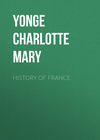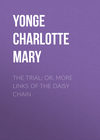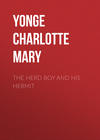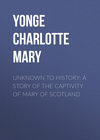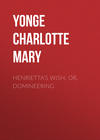Czytaj książkę: «The Long Vacation», strona 8
“I wonder he was there at all.”
“Well, Horner asked him, and he can’t get those fossils that were lost out of his head, and he thought they might be washed up. He said too, he knew they would be up to something if he wasn’t there.”
“Oh!” said Clement, with an odd recollection, “but I suppose he did not know about these cadets?”
“No, the big Horner sent up to Mother Butterfly’s for some more stuff, not so mild, and then Ted set upon me, and said it was all because of me that Vale Leston had to live like a boiling of teetotal frogs and toads, just to please the little baronet’s lady mamma, but I was a Dutchman all the same, and should sell them yet—I sucked it in so well, and they talked of seeing how much I could stand. Something about my governor, and here—that word in the Catechism.”
“Ah!” gasped Clement, fairly clutching his arm, “and what spared you?”
“Horner came down, and Sweetie Bob, that’s the errand-boy, and there was a bother about the money, for Bob wasn’t to leave anything without being paid, and while they were jawing about that, Merry laid hold of me and said, ‘Come and look for the aralia.’ They got to shouting and singing, and I don’t think they saw what was doing. They were nasty songs, and Merry touched me and said, ‘Let us go after the aralia.’ We got away without their missing us at first, but they ran after us when they found it out, and if you had not been there, Uncle Clem—”
“Thank God I was! Now, Adrian, first tell me, did you taste this stuff? You said you sucked it in.”
“Well, I did, a little. You know, uncle, one cannot always be made a baby. Women don’t understand, you know, and don’t know what a fool it makes a man to have them always after him, and have everything put out of his way like a precious infant, and people drinking it on the sly like Gerald, or—”
“Or me, eh, Adrian? I can tell you that I never tasted it for thirty years, and now only as a medicine. Lance, never.”
“But they did not treat you like a baby, and never let you see so much as a glass of beer.”
“Well, I am going to treat you like a man, but it is a sorrowful history that I have to tell you. You know that your mother and Aunt Wilmet are twin sisters?”
“Oh yes, though Aunt Wilmet is stout and jolly, and mother ever so much prettier and more delicate and nice.”
“Yes, from ill-health. She is never free from suffering.”
“I know. Old Dr. May said there was no help for it.”
“Do you know what caused that ill-health? My boy, they spoke of your father to-day—brutes that they were,” he could not help muttering.
“Yes, he died when I was a week old.”
“He had ruined himself when quite a young man, body, soul, and estate—and you too, beforehand, in estate, and broken your mother’s heart and health by being given up to that miserable habit from which we want to save you.”
“I thought it was only poor men that got drunk and beat their wives” (more knowledge, by the bye, than he was supposed to possess). “He did not beat her?”
“Oh no, no,” said Clement, “but he as surely destroyed all her happiness, and made you and your sisters very poor for your station in life, so that it is really hard to educate you, and you will have to work for yourself and them. And at only thirty-six years old his life was cut off.”
“Was that what D. T. meant? I heard Ted whisper something about that.”
“It was well,” thought Clement, “that he had grace enough to whisper. Yes, my poor boy, it is only too true. I was sent for to find your father dying of delirium tremens—you just born, your mother nearly dead, the desolation of your sisters unspeakable. He was only thirty-six, and that vice, together with racing, had devoured him and all the property that should have come to his children. I think he tried to repent at the very last, but there was little time, little power, only he put you and your sisters in my charge, and begged me to save you from being like him.”
“Did they mean that I was sure to be like that? Like a pointer puppy, pointing.”
“They meant it. And, Adrian, it is so far true that there is an inheritance—with some more, with some less—of our forefathers’ nature. Some have tendencies harder to repress than others. But, my dear boy, you know that we all have had a force given us wherewith to repress and conquer those tendencies, and that we can.”
“When we were baptized, God the Holy Spirit,” said Adrian, under his breath.
“You know it, you can believe now. Your uncle Lance and I prayed that the old nature might be put down, the new raised up. We pray, your mother and sisters have prayed ever since, that so it may be, that you may conquer any evil tendencies that may be in you; but, Adrian, no one can save you from the outside if you do not strive yourself. Now you see why your poor mother has been so anxious to keep all temptation out of your reach.”
“But I’m growing a man now. I can’t always go on so.”
“No, you can’t. You shall be treated as a man while you are with me. But I do very seriously advise you—nay, I entreat of you, not to begin taking any kind of liquor, for it would incite the taste to grow upon you, till it might become uncontrollable, and be your tyrant. If you have reason to think the pledge would be a protection to you, come to me, or to Uncle Bill.”
He was interrupted by Sibby coming in with his cup of tea, and—
“Now, Mr. Clement, whatever have you been after now? Up to your antics the minute Miss Cherry is out of the way. Aye, ye needn’t go to palavering me. I hear it in your breath,” and she darted at the stimulant.
“I’ve had some, Sibby, since I came in.”
“More reason you should have it now. Get off with you, Sir Adrian, don’t be worriting him. Now, drink that, sir, and don’t speak another word.”
He was glad to obey. He wanted to think, in much thankfulness for the present, and in faith and love which brought hope for the future.
CHAPTER XV. – A POOR FOREIGN WIDOW
Art thou a magistrate? Then be severe.—GEORGE HERBERT.
Early in the day General Mohun received a note from Clement Underwood, begging him to look in at St. Andrew’s Rock as soon as might be convenient.
“Ah,” said his sister, “I strongly suspect something wrong about the boys. Fergus was very odd and silent last night when I asked him about Jem Horner’s picnic, and he said something about that Harewood cousin being an unmitigated brute.”
“I hope Fergus was not in a scrape.”
“Oh no, it is not his way. His geology is a great safeguard. If it had been Wilfred I might have been afraid.”
“His head is full—at least as much room as the lost aralia leaves—of the examination for the Winchester College election.”
“Yes, you know Jasper has actually promised Gillian that if either of her brothers gets a scholarship, she may be allowed a year at Lady Margaret Hall.”
“Yes, it incited her to worry Wilfred beyond sufferance in his holidays. I know if you or Lily had been always at me I should have kicked as hard as he does.”
“Lily herself can hardly cram him with his holiday task; but Fergus is a good little fellow.”
“You have kept him at it in a more judgmatical way. But won’t Armytage come in between the damsel and her college?”
“Poor Mr. Armytage—Captain, I believe, for he has got his commandership. Gill snubs him desperately. I believe she is afraid of herself and her heart.”
“I hope she won’t be a goose. Jasper told me that he is an excellent fellow, and it will be an absolute misfortune if the girl is besotted enough to refuse him.”
“Girls have set up a foolish prejudice against matrimony.”
“Well, I am off. Clement Underwood is a reasonable man, and would not send for me without cause.”
General Mohun came to that opinion when he heard of the scene on the beach, and of the absolute certainty that the contraband goods had been procured at Mrs. Schnetterling’s. Before his visit was over, a note came down on gold-edged, cyphered pink paper, informing the Reverend E. C. Underwood that Mrs. Campbell was much obliged to him for his attention to her son, who was very unwell, entirely from the effects of clotted cream. And while they were still laughing over the scored words, Anna knocked at the door with a message from her aunt, to ask whether they could come and speak to poor Mrs. Edgar, who was in a dreadful state.
“It is not about Adrian, I hope?” said she.
“Oh no, no, my dear; Adrian is all right, thanks to Fergus again,” said her uncle. “He is the boy’s great protector; I only wish they could be always together.”
Poor Mrs. Edgar! Rumours had not been slow in reaching her of the condition in which her scholars had been found, very odd rumours too. One that James Campbell had been brought home insensible, and the two sailors carried on board in the like state; and an opposite report, that the poor dear boys had only made themselves sick with dainties out of Mrs. Schnetterling’s, and it was all a cruel notion of that teetotal ritualist clergyman. Some boys would not speak, others were vague and contradictory, and many knew nothing, Horner and Campbell were absent. Clement much relieved her by giving an account of the matter, and declaring that he feared his own elder nephew was the cause of all the scandal, though he believed that some of her bigger pupils were guilty of obtaining a smaller quantity, knowingly, of the Schnetterling’s illicit wares, chiefly so far for the fun of doing something forbidden—“Stolen waters are sweet.”
“A wicked woman! Surely she should not be allowed to go on.”
“I am going, on the spot, to see what can be done,” said General Mohun; “but indeed I should have thought young Campbell rather too old for your precincts.”
“Ah! yes. He is troublesome, but he is so backward, and is so delicate, that his mother has implored me to keep him on, that he may have sea-bathing. But this shall be the final stroke!”
“It will be the ruin of your school otherwise,” said the General.
“Ah! it might. And yet Mrs. Campbell will never be persuaded of the fact! And she is a person of much influence! However, I cannot have my poor dear little fellows led astray.”
Then, with some decided praises of dear little Sir Adrian, and regrets at losing Fergus Merrifield, whom she declared, on the authority of her gentleman assistant, to be certain of success, she departed; and Clement resumed his task of writing letters, which he believed to be useless, but which he felt to be right—one a grave warning to Edward Harewood, and one to his father, whose indulgence he could not but hold accountable.
Reginald Mohun meanwhile went his way to the officer of Inland Revenue, who already had his suspicions as to Mrs. Schnetterling, and was glad of positive evidence. He returned with the General to hear from Mr. Underwood the condition in which he had found the boys, and the cause he had for attributing it to the supplies from Mother Butterfly, and this was thought sufficient evidence to authorize the sending a constable with a search-warrant to the shop. The two gentlemen were glad that the detection should be possible without either sending a spy, or forcing evidence from the boys, who had much better be kept out of the matter altogether. No lack of illicit stores was found when the policemen made their descent, and a summons was accordingly served on its mistress to appear at the next Petty Sessions.
Reginald Mohun, used to the justice of county magistrates, and the unflinching dealings of courts-martial, was determined to see the affair through, so he went to the magistrates’ meeting, and returned with the tidings that the possession of smuggled tobacco ready for sale had been proved against Mrs. Schnetterling, and she had been fined twenty-five pounds, to be paid at the next Petty Sessions. Otherwise goods would be seized to that value, or she would have a short term of imprisonment. There was no doubt that contraband spirits were also found, but it was not thought expedient to press this charge.
He said the poor woman had been in a great passion of despair, wringing her hands and weeping demonstratively.
“Quite theatrical,” he said. “I am sure she has been an actress.”
“It did not prejudice your hard-headed town-councillors in her favour,” said Gerald.
“Far from it! In fact old Simmonds observed that she was a painted foreign Jezebel.”
“Not to her face!” said Gerald.
“We are not quite brutes, whatever you may think us, my boy,” said the General good-humouredly.
“Well,” said Gerald, in the same tone, “how could I tell how it might be when the Philistines conspired to hunt down a poor foreign widow trying to pick up a scanty livelihood?”
“If the poor foreign widow had been content without corrupting the boys,” said Clement, “she would have been let alone.”
“It was not for corrupting the boys. That was done—or not done—by my amiable cousin Ted. What harm did her ‘baccy do to living soul?”
“It is a risky thing, to say the least of it, for a living soul to defraud the revenue,” said Clement.
“Of which probably she never heard.”
“She must have seen the terms of her licence,” said the General.
“Aye, a way of increasing the revenue by burthens on the chief solace of poverty,” said Gerald hotly.
“You’ll come to your senses by and by, young man,” imperturbably answered the General.
“Is she likely to be able to pay?” asked Gerald in return.
“Oh yes, the policeman said she drove a very thriving trade, both with the boys and with the sailors, and that there was no doubt that she could pay.”
Clement was very glad to hear it, for it not only obviated any sense of harshness in his mind, but he thought Gerald, in his present mood of compassion—or opposition, whichever it was—capable of offering to undertake to pay the fine for her.
Poor little Ludmilla was found the next day by Mrs. Henderson, crying softly over her work at the mosaic department—work which was only the mechanical arrangement from patterns provided, for she had no originality, and would never attain to any promotion in the profession.
Mrs. Henderson took the poor girl to her own little office, to try to comfort her, and bring her into condition for the rehearsal of the scene with Ferdinand, which she was to go through in Mr. Flight’s parlour chaperoned by his mother. She was so choked with sobs that it did not seem probable that she would have any voice; for she had been struggling with her tears all day, and now, in the presence of her friend, she gave them a free course. She thought it so cruel—so very cruel of the gentlemen; how could they do such a thing to a poor helpless stranger? And that tall one—to be a clergyman—how could he?
Mrs. Henderson tried to represent that, having accepted the licence on certain terms, it was wrong to break them; and that the gentlemen must be right to hinder harm to their nephews.
It seemed all past the poor girl’s understanding, since the nephews had taken no harm; and indeed the other boys had only touched the spirits by way of joke and doing something forbidden: it had all come of those horrid young midshipmen, who had come down and worried and bothered her mother into giving them the bottles of spirits which had not been mixed. It was very hard.
“Ah, Lydia, one sin leads no one knows where! Those little boys, think of their first learning the taste for alcohol in secret!”
Lydia did see this, but after all, she said, it was not the spirits, but the tobacco, which the Dutch and American sailors were glad enough to exchange for her mother’s commodities. She had never perceived any harm in the arrangement, and hardly comprehended when the saying, “Custom to whom custom,” was pointed out to her.
Kalliope asked whether the fine would fall heavily on her mother.
“Oh, that is worst of all. Mother is gone to Avoncester to raise the money. She won’t tell me how. And I do believe O’Leary’s circus is there.”
Then came another sobbing fit.
“But how—what do you mean, my dear?”
“O’Leary was our clown when my father—my dear father—was alive. He was a coarse horrid man, as cruel to the poor dear horses as he dared. And now he has set up for himself, and has been going about all over the county. Mother has been quite different ever since she met him one day in Avoncester, and I fear—oh, I fear he will advance her this money, and make her give me up to him; and my dear father made her promise that I would never be on the boards.”
This was in an agony of crying, and it appeared that Schnetterling had really been a very decent, amiable person, who had been passionately fond of his little daughter. Her recollection dated from the time when the family had come from America, and he had become partner in a circus, intending to collect means enough to retire to a home in Germany, but he had died five years ago, at Avoncester, of fever, and his wife had used his savings to set up this little shop at Rockquay, choosing that place because it was the resort of foreign trading-vessels, with whom her knowledge of languages would be available. She had suffered from the same illness, and her voice had been affected at the time, and she was altogether subdued and altered, and had allowed her daughter to receive a good National school training; but with the recovery of health, activity, and voice, a new temper, or rather the old one renewed, had seized her, and since she had met her former companion, Ludmilla foreboded that the impulse of wandering had come upon her, and that if the interference of the authorities pressed upon her and endangered her traffic, she would throw it up altogether, and drag her daughter into the profession so dreadful to all the poor child’s feelings.
No wonder that the girl cried till she had no voice, and took but partial comfort from repeated assurances that her friends would do their utmost on her behalf. Mrs. Henderson tried to compose and cheer her, walking with her herself to St. Kenelm’s Parsonage, and trying to keep up her earnest desire to please Mr. Flight, the special object of her veneration. But wishes were ineffectual to prevent her from breaking down in the first line of her first song, and when Mr. Flight blamed, and Lady Flight turned round on the music-stool to say severely—“Command yourself, Lydia,” she became almost hysterical.
“Wait a minute,” said Gerald. “Give her a glass of wine, and she will be better.”
“Oh no, no; please, I’m temp—” and a sob.
The five o’clock tea was still standing on a little table, and Gerald poured out a cup and took it to her, then set her down in an arm-chair, and said—
“I’ll go through Angus’ part, and she will be better,” and as she tried to say “Thank you,” and “So kind,” he held up his hand, and told her to be silent. In fact, his encouragement, and the little delay he had made, enabled her to recover herself enough to get through her part, though nothing like as well as would have been expected of her.
“Never mind,” said Gerald, “she will be all right when my uncle comes. Won’t you, Mona?”
“I should have expected—” began Lady Flight.
Gerald held up his hand in entreaty.
“People’s voices can’t be always the same,” he said cheerily. “I know our Mona will do us credit yet! Won’t you, Mona? You know how to pity me with my logs!”
“You had better go and have some tea in the kitchen, Lydia,” said Lady Flight repressively; and Ludmilla curtsied herself off, with a look of gratitude out of her swollen eyelids at Gerald.
“Poor little mortal,” he said, as she went. “I am afraid that in her case summum jus was summa injuria.”
“It was quite right to prosecute that mischievous woman,” said Mr. Flight.
“Maybe,” said Gerald; “but wheat will grow alongside of tares.”
“I hope the girl is wheat,” half ironically and severely said the lady.
Gerald shrugged his shoulders and took his leave.
CHAPTER XVI. – “SEE, THE CONQUERING HERO COMES”
And with trumpets and with banners
As becomes gintale good manners.—THACKERAY.
A telegram from Sir Jasper brought the good news that Fergus’s name was high on the Winchester roll, and that he was sure of entering college after the holidays. Gillian alone was allowed to go up to the station with her uncle Reginald to meet the travellers, lest the whole family should be too demonstrative in their welcome. And at the same time there emerged from the train not only Captain Armytage, but also Lancelot Underwood and his little boy. All the rest of his family were gone to Stoneborough to delight the hearts of Dr. May and his daughter Ethel.
Gillian was in such training that she durst not embrace her brother when he tumbled out of the carriage, though she could hardly keep her feet from dancing, but she only demurely said—
“Mamma and all of them are at Aunt Jane’s.”
“Come then,” said Sir Jasper to Captain Armytage, for which Gillian was not grateful, or thought herself not, for she made a wry face.
There was a good deal of luggage—theatrical appliances to be sent to the pavilion.
“This may as well go too,” said Captain Armytage.
“Oh! oh! It is the buccaneer’s sword!” cried little Felix. “How lovely! Last time we only had Uncle Jack’s, and this is ever so much longer!”
“Do let me draw it!” cried Fergus.
“Not here, my boy, or they would think a conspiracy was breaking out. Ha!” as a sudden blare of trumpets broke out as they reached the station gate.
“Oh, is it for him?” cried Felix, who had been instructed in Fergus’s triumph.
“See, the conquering hero comes,
Sound the trumpets, beat the drums!”
said the General.
Fergus actually coloured crimson, but the colour was deepened as he muttered “Bosh!” while two piebald ponies, drawing the drummers and trumpeters in fantastic raiment, preceded an elephant shrouded in scarlet and gold trappings, with two or three figures making contortions on his back, and followed by a crowned and sceptred dame in blue, white, and gold, perched aloft on a car drawn by four steeds in glittering caparisons.
“Will you mount it, Fergus?” asked his uncle. “You did not expect such a demonstration.”
Fergus bit his lip. It was hard to be teased instead of exalted; but Fely and he were absorbed in the pink broadsides that the lady in the car was scattering.
CIRCUS—THIS NIGHT—ROTHERWOOD PARK
The Sepoy’s Revenge!
Thrilling Incidents!
Sagacious Elephant!
Dance of Arab Coursers!!
Acrobatic Feats!! &c., &c
“Oh, daddy! daddy! do take me to see it!”
“Father, I should like to see it very much indeed,” were the exclamations of the two little boys. “You know I have never seen any acrobatic feats.”
“A long word enough to please you,” said Uncle Reginald. “He deserves something. I’ll take you, master.”
“I should think this was not of the first quality,” said Sir Jasper.
“Never mind. Novelty is the charm that one can have only once in one’s life,” said the General.
“Some of those van fellows are very decent folk,” said Lancelot. “I have seen a great deal of them at Bexley Fair times. You would be astonished to know how grateful they are for a little treatment as if they were not out of humanity’s reach.”
Gillian was trying to make Fergus tell her what his questions had been, and how he had answered them.
“I declare, Gill, you are as bad as some of the boys’ horrid governors. There was one whose father walked him up and down and wouldn’t let him play cricket, and went over all the old questions with him. I should never have got in, if papa hadn’t had more sense than to badger me out of my life.”
At the gate between the copper beeches the Underwoods and Merrifields parted, with an engagement to meet at the circus on the part of the boys and their conductors.
Fergus was greeted with open-mouthed, open-armed delight by all the assembled multitude, very little checked by the presence of Captain Armytage. Only Lady Merrifield did not say much, but there was a dew in her eyes as she held fast the little active fingers, and whispered—
“My good industrious boy.”
Sir Jasper, in his grand and gracious manner, turned to his sister-in-law, saying—
“We could not but come first to you, Jane, for it is to you that he is indebted, as we all are, primarily for his success.”
“That is the greatest compliment I ever had, Jasper,” she answered, smiling but almost tearful, and laughing it off. “I feel ready to mount yonder elephant lady’s triumphal car.”
The General refrained from any more teasing of Fergus on his first impression; and at seven that evening the younger Merrifield boys with their uncle, and the two from St. Andrew’s Rock with Lance, set off in high spirits.
They re-appeared much sooner than they were expected at Beechcroft Cottage, where the Underwoods were spending the long twilight evening.
“A low concern!” was the General’s verdict.
“We fled simultaneously from the concluding ballet,” said Lance. “There had been quite as much as we could bear for ingenuous youth.”
“We stood the Sepoy’s Death Song,” said the General, “but the poster of the Bleeding Bride was enough for us.”
“They had only one elephant!” cried Adrian.
“A regular swindle,” said Wilfred.
“No lions!” added Fely, “nothing to see but that poor old elephant! I wish he would have turned round and spouted water at them, as that one did to the tailor.”
“Water would be uncommonly good for them,” said the General, laughing, “they are not much acquainted therewith.”
“And such an atmosphere!” said Lance.
“I see it on your forehead, poor boy,” said Geraldine.
“I should like to set on the Society against cruelty to animals,” said the General; “I saw galls on the horses’ necks, and they were all half starved.”
“Then to see the poor old elephant pretend to be drunk!” added Fergus, “stagger about, and led off by the policeman, drunk and disorderly!”
“Was that being drunk?” asked Adrian, with wide-open eyes. “It was like Campbell that day.” Everybody laughed.
Wilfred did so now.
“You green kid, you.”
“Happy verdure,” said the General, “to be unaware that some people can laugh when they ought to weep.”
“Weep!” exclaimed Wilfred, “every time one sees a fellow screwy in the street.”
“Perhaps the angels do,” murmured Clement.
“Come, Master Wilfred, you have expressed your opinions sufficiently to-night,” said the General. “Suppose you and Fergus walk home together. A nasty low place as ever I saw. I have a mind to tell the Mayor about it.”
Gerald said—
“Is not that making yourself very unpopular?”
“That is no great matter,” said the General, rather surprised.
“I should have thought it better to refine the people’s tastes than to thwart their present ones.”
“The improper must be stopped before the taste for the proper can be promoted,” said Clement.
“With all the opposition and ill-blood that you cause?” said Gerald. “Why, if I were an errand-boy, the suppression would send me direct to the circus. Would it not do the same by you, Uncle Lance?”
“Discouragement might, prohibition would prevent wholly, and I should be thankful,” said Lance.
“Ah! you are of the old loyal nature,” said Gerald. “You of the old school can never see things by modern lights.”
“I am thankful to say—not,” responded Reginald Mohun, in a tone that made some laugh, and Gerald sigh in Anna’s ear—
“Happy those who see only one side of a question.”
There was another great day for the boys, namely, the speech or closing day at the school, when Fergus was the undoubted hero, and was so exalted that his parents thought it would be very bad for him, and were chiefly consoled by his strong and genuine dislike to having to declaim with Clement Varley the quarrel of Brutus and Cassius. He insisted on always calling the former “Old Brute,” and all the efforts of mother and aunt never got him beyond the dogged repetition of a lesson learnt by heart, whereas little Varley threw himself into the part with spirit that gained all the applause. Fergus carried off a pile of prizes too, but despised them. “Stupid old poetry!” said he, “what should I do with that? Do let me change it, father, for the Handbook of Paleontology, or something worth having.”
Adrian had three prizes too, filling Anna with infinite delight. He was not to go home immediately on the break-up of the school, but was to wait for his sisters, who were coming in a few days more with Lady Travis Underwood to the bazaar and masque, so that he would go home with them.
Neither the prospect nor the company of little Fely greatly reconciled him to the delay, but his mother could not believe that her darling could travel alone, and his only satisfaction was in helping Fergus to arrange his spare specimens for sale.











